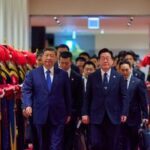Putin Suggests Cryptocurrencies Could Replace the Dollar in Russia’s Financial Future
wikitree Views
Russian President Vladimir Putin has sparked new controversy in the international economic order by mentioning cryptocurrencies, including Bitcoin, as a potential financial alternative.

During an investment conference held in Moscow on Wednesday, Putin highlighted the possibilities of cryptocurrencies while addressing Western sanctions and frozen foreign exchange reserves. This has been interpreted as part of Russia’s strategy to strengthen its financial independence in response to Western economic sanctions.
Putin cited Western nations freezing approximately $300 billion of Russia’s foreign exchange reserves, highlighting the risks of holding foreign currency.
He questioned, “Why should we accumulate foreign currency reserves that can be easily lost?” thereby challenging the existing foreign exchange-centered international financial system.
Putin criticized these foreign exchange freezing measures as undermining the credibility of the U.S. dollar and suggested that cryptocurrencies could serve as an alternative.
He emphasized Bitcoin’s decentralized nature, stating, “Who can ban Bitcoin?”
This underscores the distinctiveness of cryptocurrencies compared to traditional currencies controlled by central banks and suggests their potential as a means to circumvent international financial sanctions.
In addition to Bitcoin, Putin also mentioned electronic payment systems as another alternative, leaving the possibility of replacing traditional financial systems open.
His remarks come as Russia reevaluates its stance on cryptocurrencies amidst Western sanctions.
Russia imposed a complete ban on cryptocurrencies in 2022. However, following stringent Western sanctions due to the war in Ukraine, Russia has shifted its focus to cryptocurrencies and digital finance.
Russia is preparing to introduce the digital ruble, issued by Russia’s central bank, which is expected to be fully implemented next summer. The ruble aims to reduce dependence on the existing financial system for international payments and create an independent payment network.














Most Commented